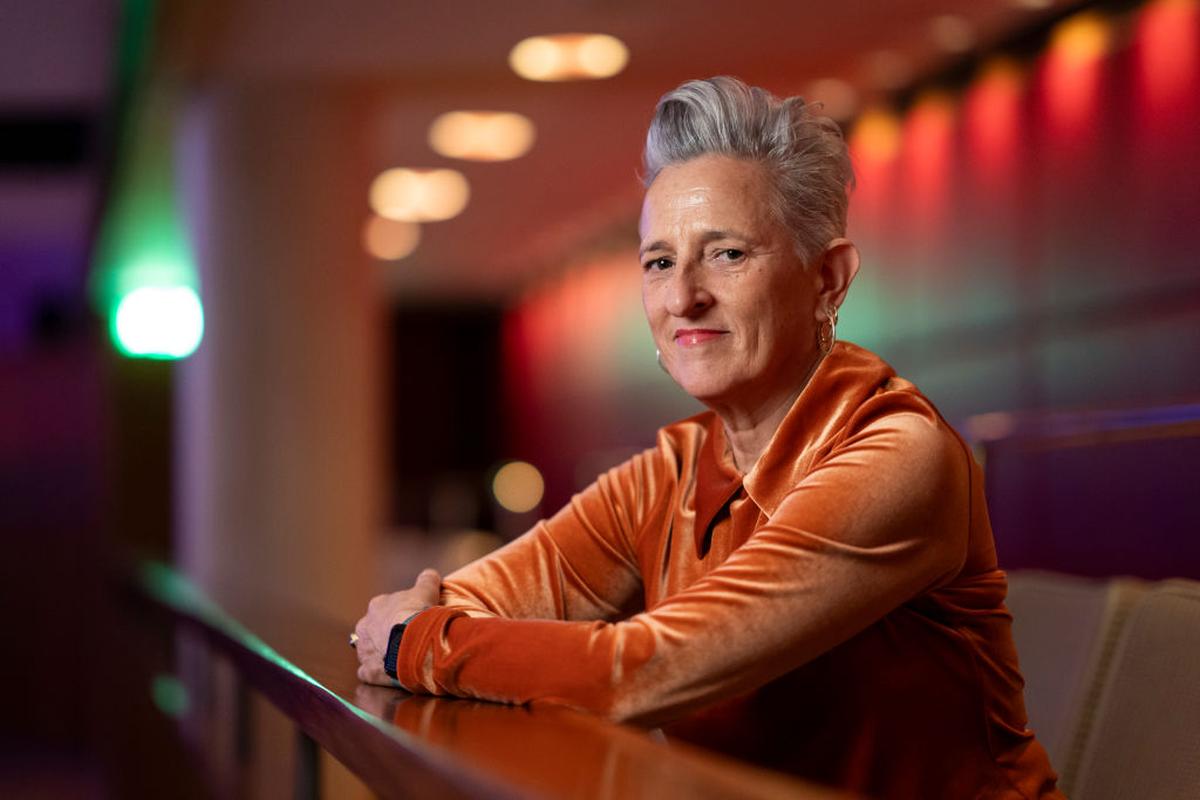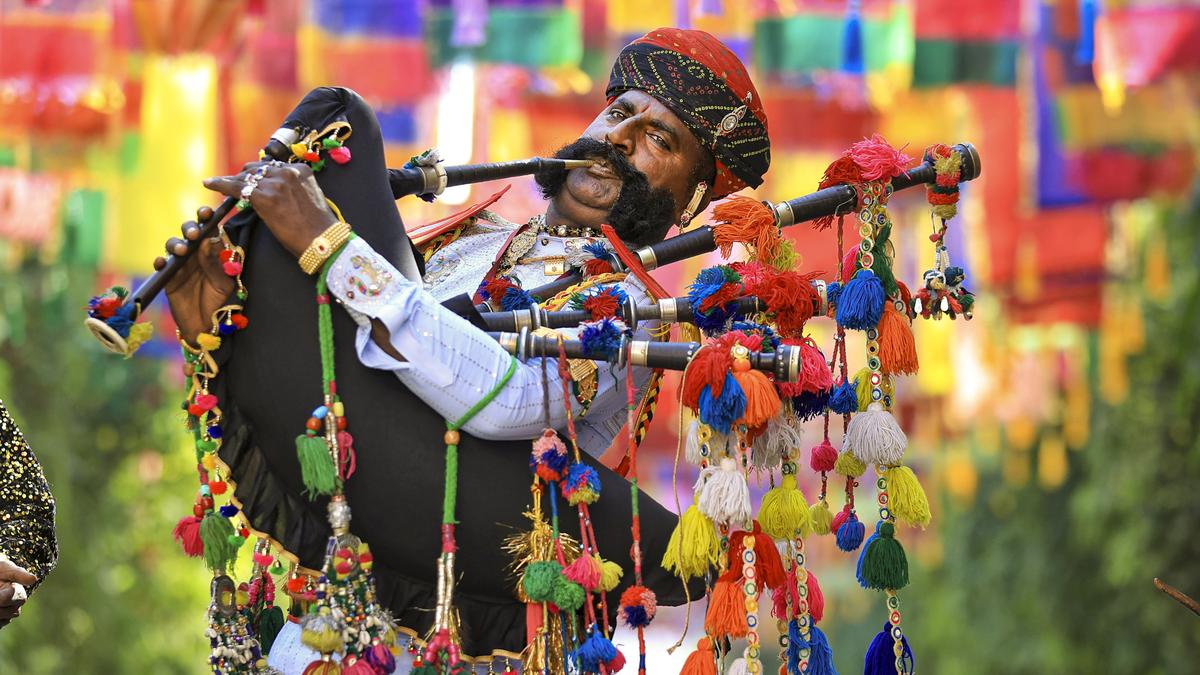Jaipur: A folk artist at the ‘Jaipur Literature Festival’ (JLF), in Jaipur, Thursday, Jan. 30, 2025. (PTI Photo) (PTI01_30_2025_000202A)
| Photo Credit: –
(This story is part of The Hindu on Books newsletter that comes to you with book reviews, reading recommendations, interviews with authors and more. Subscribe here.)
Welcome to this edition of The Hindu on Books Newsletter. “JLF is JLF”, says Suhasini Haidar in an essay on notes from the just-concluded Jaipur Literature Festival, which was first held in 2006, and in that sense, the OG. The organisers led by authors William Dalrymple and Namita Gokhale, as well as Sanjoy Roy, who runs a mega production and event management company, say that more than five million people and about 8,000 speakers have attended the festival in nearly 20 years. One of the major themes this year, writes Haidar, was the use of Artificial Intelligence (AI) in publishing. The other overarching issue was Palestine and the Israel-Gaza conflict with writers such as Pankaj Mishra, Avi Shlaim, Selma Dabbagh, diplomats Navtej Sarna, Kishore Mahbubani, Navdeep Suri and others discussing it threadbare. The showstopper, however, was Gideon Levy, the Haaretz columnist who did not mince words about Israel’s actions and the relentless bombardment of Gaza.
This week, we read a review of a book on LTTE chief Velupillai Prabhakaran by Eric Solheim, the chief peace negotiator between the LTTE and the Sri Lankan government, and another on the feminist movement in Pakistan; we also talk to Booker Prize 2024-shortlisted author Charlotte Wood, and Amrita Shah about her new book.
Books of the week
As the chief negotiator in the Sri Lankan peace process, Eric Solheim often asked himself the question: How did “guns become the answer to overcome each and every obstacle in the Chessboard of Tamil Eelam?” in the mind of LTTE chief Velupillai Prabhakaran. Reviewing the book by the Indian journalist, M.R. Narayan Swamy, who more than anyone has followed the story of The Liberation Tigers of Tamil Eelam (LTTE), Solheim says Swamy sets out to answer this question in his well-researched The Rout of Prabhakaran (Konark Publishers). Two explanations stand out in Swamy’s telling, writes Solheim. Prabhakaran had a very narrow horizon; he did not understand geopolitics or the workings of the big neighbour, India, nor did he interact with Sinhalese or Muslims. Secondly, the LTTE was primarily a military movement. It did not involve itself in mass work, political mobilisation or humanitarian efforts. There is a history of guerrilla fighters turning themselves into successful political leaders – Prabhakaran did not choose this route, and his many mistakes led to his rout in 2009, as Swamy has traced.

LONDON, ENGLAND – NOVEMBER 11: Charlotte Wood, author of ‘Stone Yard Devotional’ during the Booker Prize 2024 Shortlist photocall at The Royal Festival Hall on November 11, 2024 in London, England. (Photo by David Levenson/Getty Images)
| Photo Credit:
David Levenson
The good news first. Charlotte Wood, whose book Stone Yard Devotional (Hachette India), a quest for stillness amid all the madness, was shortlisted for the Booker Prize last year, is in the “embryonic stage of penning her new book.” Big on settings – Stone Yard plays out at a Catholic nuns’ monastery in the sparse Monaro plains of southern New South Wales – Wood tells Amarjot Kaur on the sidelines of JLF that the new book “is going to be based in a retail workplace.” Location sets the tone for the storyline in several of her books. “That’s helpful because people [characters] have to respond to the place. It is what filmmakers sometimes call a single arena. So, by starting with a place — like a convent [in Stone Yard] where all my characters choose a life, but don’t necessarily get along with each other — I create a contained environment, which is very useful for creating friction.” Wood, 60, took to writing at the age of 29 when her mother passed away, but she does not necessarily view it as a cathartic escape. She chooses to call it art, instead.
The Feminisms of our Mothers (Zubaan Books), edited by Daanika Kamal, is a collection of essays written by Pakistani authors and activists about their mothers, exploring the nuances of feminism through generations of women. Kamal, a researcher and writer from Karachi, writes in the Introduction that the women’s movement in Pakistan is as varied as the women it represents. “Yet, there is more that unites than separates.” The diverse essays in the anthology, from Maham Javaid’s ‘What My Mother Taught Me’ (things to learn and unlearn from a mother), Amna Baig’s ‘Caged Within’ (how it took her mother a lifetime to break free from the shackles of patriarchy, and the lessons it held for her daughter) to Aimun Faisal’s ‘Love Unspoken, Love Unheard’ (in which she says she lives in hope of the promise her mother made: tomorrow will be better), and others spotlight experiences of mother-daughter relationships and their shared endeavour to make the world a better place for the next generation. “I have lost count of all the women I carry within me,” writes journalist and gender scholar Maria Amir in her essay, ‘All the Women in Me are on Fire’. Shaped largely, “for better and worse,” by women — mother, stepmother, grandmothers, aunts — Amir says in her case the overwhelming emotion she carries from all these influences is a feeling of rage. “It is often a rage that has been suppressed, sidelined and swallowed, but a rage that simmers in me…,” she notes, raising two questions, “Does fire have a shape? Does rage?”
Spotlight
Amrita Shah’s book, The Other Mohan in Britain’s Indian Ocean Empire (Harper), is a deeply researched historical work on the Indian diaspora in Britain’s Indian Ocean world. Shah’s book, says Uday Balakrishnan who interviewed the writer, focuses on South Africa where Gandhi honed his novel nonviolent protest against the racially discriminatory practices of the colonial administration. Intertwined with the fascinating historical background is a compelling account of Shah’s search to make sense of her great grandfather, Mohanlal Killavala’s unexplained travels to South Africa via Mauritius, from Bombay, and her attempt to discover the identity of the woman he met on the way, who gave birth to the child who would become her grandmother. Shah’s quest becomes a travelogue linking past and present. Asked why she chose to intertwine the historical with the personal, Shah explained: “I started out wanting to know more about my great grandfather’s journey and to discover who my great grandmother was. But it soon dawned on me that the story I was researching said a lot about India’s encounter with western modernity: the privileging of English, the breaking of taboos such as the ban on Hindus travelling overseas, technology – the steamer, the telegraph, and the erasure of old signifiers like caste and language in the settling of new societies. And then I found a connection between my great grandfather Mohanlal and Gandhi which provided an entry point into a historical event — Gandhi’s campaign in 1906-1909 against the infamous ‘Black Law’ which required Indians to register themselves with fingerprints. It also led me to archival findings which gave me a completely new perspective on this celebrated confrontation.”
Browser
-
Focusing on the activities of a group of ‘Radicals’ called ‘Young Bengal’, students of Henry Derozio, Rosinka Chaudhuri examines their achievements in the 19th century in her new book India’s First Radicals: Young Bengal and the British Empire (Viking). They campaigned for the rights of peasants, and fought against corruption, and racial, gender and caste discrimination in society.
- Students Etched in Memory (Hamish Hamilton) is a collection of essays by Perumal Murugan, translated by Iswarya V. delves into the lives of college students in small-town Tamil Nadu and follows their journeys. Against the backdrop of contemporary India, the essays reflect the challenges students face like family pressures, pulls of class, caste, gender, and expectations.
-
The second book in Udayan Mukherjee’s Neville Wadia mystery series, Scarlet Sands (Picador India), is set in Goa. When the body of British journalist Joshua Davies washes ashore on a beach, the police are quick to call it an accidental drowning. But his sister Mia refuses to accept this verdict and enlists the help of Neville and Shehnaz Wadia who after twists and turns unravel the truth. The first in the series was A Death in the Himalayas, which won the hearts of both critics and readers.
- The Wanderer (eka) by V. Shinilal, translated by Nandakumar K., is the story of passengers on the Sampark Kranti Express which is set to travel over 3,000 km from Thiruvananthapuram to Chandigarh, a journey that will take more than 56 hours. Every traveller on the train has a tale inside of them, and Karamchand, a fellow passenger, narrates his observations, making it a parallel journey along with the train’s. It was published in Malayalam as Sambarkkakranthi.
Published – February 11, 2025 01:44 pm IST
Follow 11bet to update the latest information
